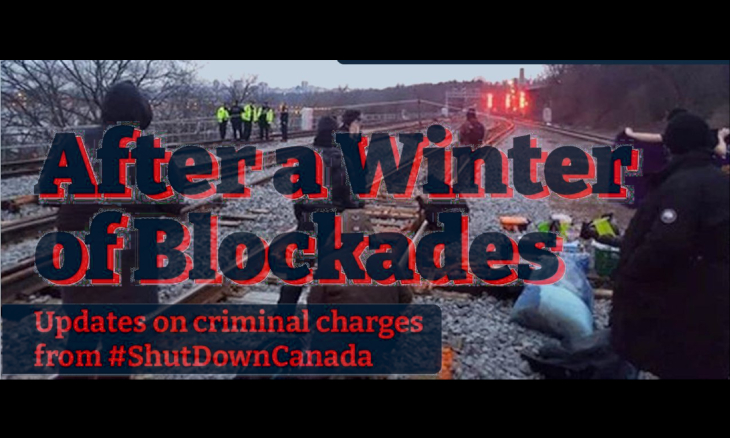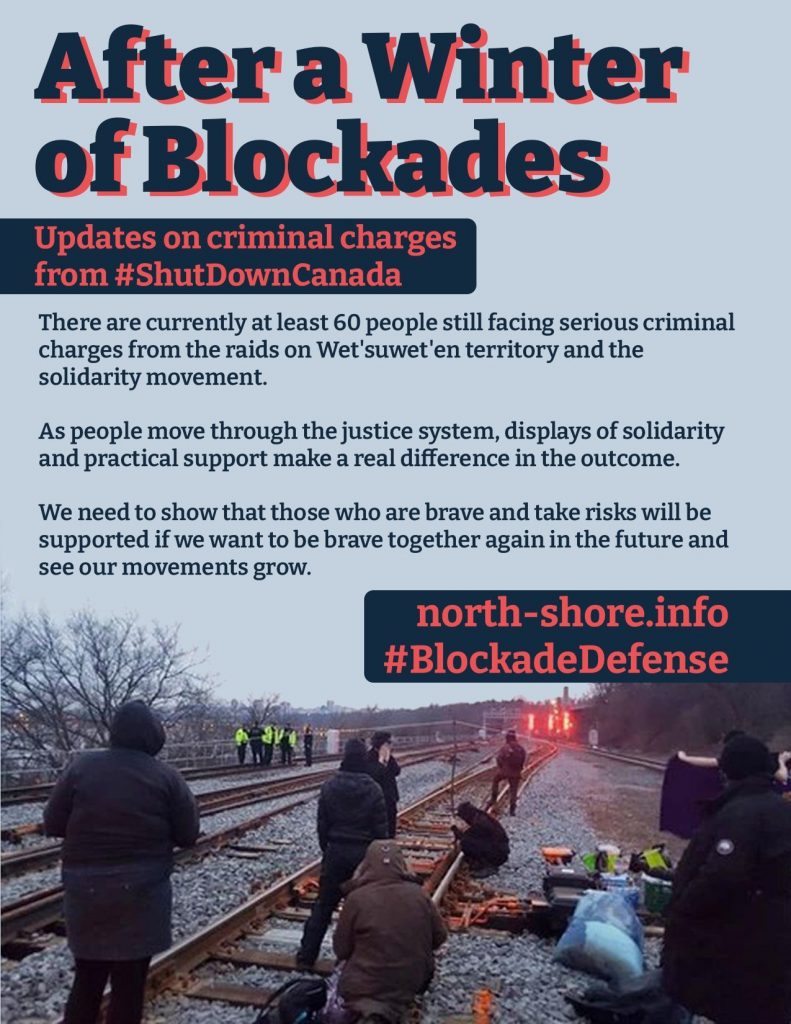
8.5 x 11 pdf poster file for printing or sharing!
It’s been almost a year since the wave of blockades in solidarity with Wet’suwet’en land defenders known as Shut Down Canada. Since then, there has been no shortage of urgent issues, and public attention has moved on. However, for both those on the front lines and those still facing charges, moving on has not been an option.
There are currently at least sixty people still facing serious criminal charges from the raids on Wet’suwet’en territory and the solidarity movement. These actions involved thousands of people in every province of the country, and it’s impossible to describe them briefly, but here are a few aspects:
In January 2020, solidarity actions began as the RCMP prepared their latest offensive against the decade-long reclamation of Wet’suwet’en territory. When the raid started in earnest in early February, Mohawks at Tyendinaga launched a rail blockade shutting down traffic between Toronto, Ottawa, and Montreal. Rail disruption immediately became the preferred tactic for the movement and in the coming weeks, long-term, Indigenous-led blockades occurred as well in Kahnawake, Listuguj, Six Nations and New Hazelton. Shorter (and sometimes repeat) blockades happened in Halifax, Toronto, Victoria, Vancouver, Magnetewan, Coquitlam, Hamilton, Morris, Saint-Pascal, Edmonton, Saint-Lambert, Kamloops, Saskatoon, Elsipogtog, Saguenay, and across the border in Washington state. Demonstrations and road blockades occurred in many places as well.
From that massive mobilization, twenty-eight people from Tyendinaga Mohawk territory are still fighting charges, following the OPP’s attack on their community. The next largest group of defendants is from a blockade outside of Sherbrooke, Quebec, where some fifteen people are waiting for trial. In Hamilton, Ontario, six people are each facing four counts of indictable mischief for a 24 hour rail blockade. In the Bas-Saint-Laurent, one person stil has charges from a rail disruption and two people in Montreal have mischief charges for alleged graffiti.
During the previous winter, in January 2019, there was also a violent RCMP raid on Wet’suwet’en territory. Although the solidarity mobilization was smaller, it still saw significant demos, occupations, and blockades across the country, and these too were met with repression.
Two people who were present at the blockades on Wet’suwet’en territory during the 2019 raid still have assault police charges. In Hamilton, one person is charged for alleged vandalism at an RCMP detachment. In Montreal, six people are still dealing with charges connected to the blockade of the Jacques-Cartier bridge.
Nearly a hundred and fifty people were arrested during these two years of struggle. Many were released without charge, others simply got tickets. Some of the criminal charges laid have resolved. For instance this fall, twelve people charged from a rail blockade in Toronto saw their charges withdrawn, two in Vancouver received discharges, and all charges were dropped against those arrested on Wet’suwet’en territory during the raid last February (though the RCMP report their investigation is ongoing).
That more charges are resolving is certainly good news, however we also need to be cautious. The legal system drops charges against some in order to isolate and delegtimize others. Even as we celebrate, we need to remember that it’s likely some of those still charged will end up in prison for moments of struggle we all shared.
Everyone does not face the legal system on an equal footing. It is deeply racist and colonial, and Indigenous defendants are more likely to be found guilty and to receive harsher sentences. As well, those with criminal records, especially ones stemming from their political involvement, will also receive worse treatment and are more likely to do prison time.
The movement last winter was incredibly powerful, and the struggle isn’t over. On Wet’suwet’en territory, work on the pipeline hasn’t stopped for the pandemic, and land defenders on the front lines haven’t stopped resisting. This is true for many other Indigenous peoples across Canada — from Mi’kma’ki to Six Nations to Secwempec territory, this has been a landmark year for Indigenous resistance and assertions of sovereignty. These currents will continue overlapping with resistance to industrial expansion, creating new possibilities and sites of resistance. Nothing stopped, and there will be other times when we will need to shut down Canada again.
All successful movements face repression and have prisoners. More than avoiding repression, what matters is how we deal with it. We need to always be finding ways to show those targeted they are not alone — this makes it easier for them to get through it with strength and integrity. As people move through the justice system, displays of solidarity and practical support make a real difference in the outcome. We need to show that those who are brave and take risks will be supported if we want to be brave together again in the future and see our movements grow.
We will continue sharing updates on North Shore Counter-Info with details about the changing legal situation, and will also amplify fundraising efforts and specific asks from defendants for solidarity or support. On North Shore, they will be under the tag “Blockade Defense” (north-shore.info/tag/blockade-defense) and on Twitter under the hashtag #BlockadeDefense.
If we are forgetting anyone or you have any comments, get in touch in English or French at blockadedefense@riseup.net. The pgp key is available at keys.openpgp.org.



